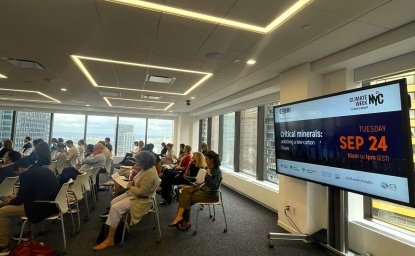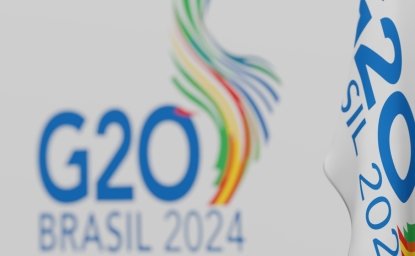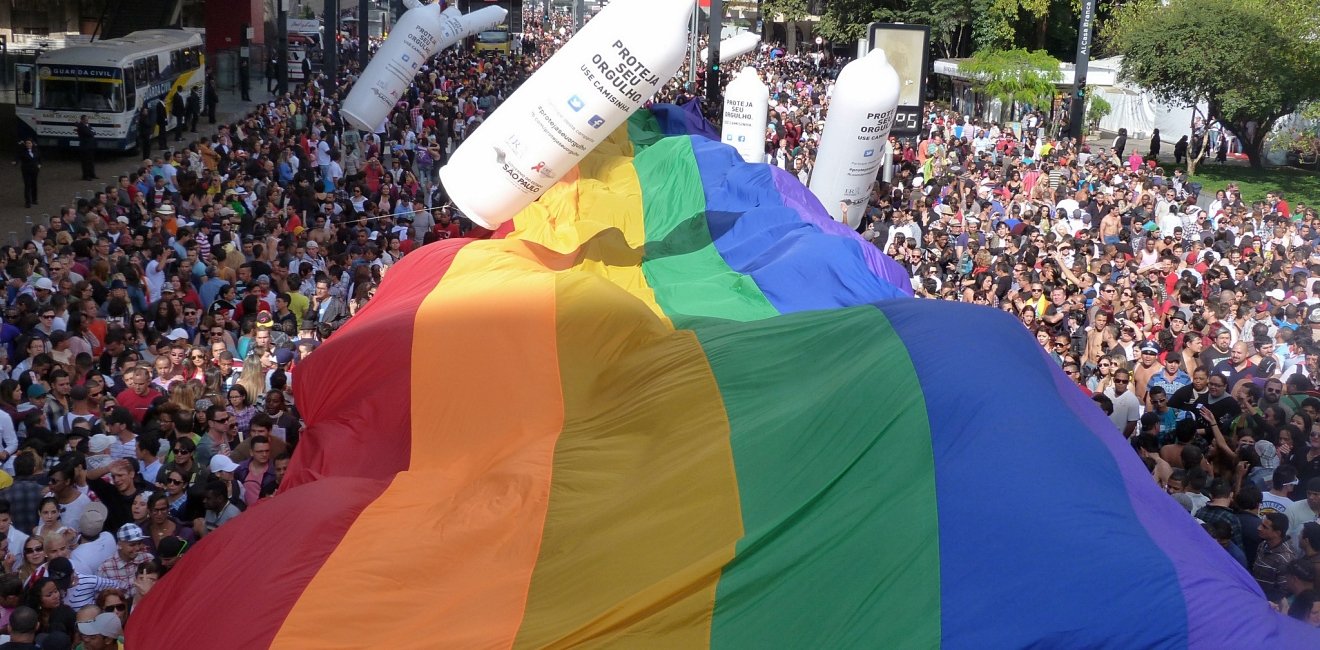
A blog of the Brazil Institute
In remembrance of the 1969 Stonewall riots, June has become Pride Month in the United States, welcoming celebration of LGBTQ+ identity and rights. On June 3, a week prior to Washington, DC’s Pride Parade, São Paulo hosted its own celebration. Organized by the non-governmental organization APOLOGBT SP, the parade had strong political undertones, with the slogan “Power to LGBTI+, Our Vote, Our Voice.” The organization’s president, Claudia Regina, emphasized the importance of the upcoming elections for the LGBTQ+ community and its allies: through activism and political mobilization, specifically by voting in October, the LGBTQ+ community has the opportunity to fight for its rights. Participants similarly saw the event as a political opportunity. One such participant, Otavio Silva, wrote in an op-ed in El País that he had returned to the parade for the first time in ten years not to party, but to push for political action.
The São Paulo Pride Parade’s focus on political activism is notable given the challenging environment for the LGBTQ+ community in Brazil. In its 2017 report on violence against LBGTQ+ individuals, the Grupo Gay da Bahia (GGB)—the oldest LBGTQ+ rights organization in Brazil—found that there were 445 deaths[1] in the last year due to sexual or gender orientation: the largest number in thirty-eight years, and representing a 30 percent increase from 2016. Among the LGBTQ+ population, transgender people are at the most risk. Transgender Brazilians are at twelve times the risk of being killed compared to transgender Americans. Moreover, most perpetrators go unpunished. LGBTQ+ discrimination is not legally identified as a hate crime—unlike racism—and femicide laws do not include transgender women. As a result, even in cases where individuals are tried and found guilty, the sentences tend to be lighter than comparable cases involving other underprivileged and/or minority groups.
Although Brazil does not criminalize sexual minorities, the data in the GGB report shows that the country still falls short of several of United Nations (UN) benchmarks for the treatment of LGBTQ+ people. The UN report Born Free and Equal - Sexual Orientation and Gender Identity in International Human Rights Law recommends that states protect people from homophobic and transphobic violence; prohibit discrimination on the basis of sexual orientation and gender identity by enacting comprehensive laws; and safeguard freedom of expression for LGBTQ+ people—all of which remain lacking for LGBTQ+ Brazilians. Yet there is a juxtaposition between not only the Brazilian reality and international standards, but also between Brazil’s domestic environment and its international stance. The Brazilian delegation has introduced several draft resolutions on human rights, sexual orientation, and gender identity and expression to the Organization of American States (OAS), and Brazil is one of the founding members of the OAS LGBTI Core Group. The country is at the forefront of championing LGBTQ+ rights in international forums, but according to Amnesty International, more LGBTQ+ were killed in Brazil in 2017 than anywhere else in the world.
Violence against LGBTQ+ people in Brazil is not only connected to individual prejudices, but also to cultural and institutional homophobia, according to social scientist Eduardo Michels. To Michels, who oversees the GGB database on homophobia-related homicides, the lack of legal support represents an institutional constraint, while a heteronormative culture of machismo validates oppression. Nonetheless, GGB’s founder Luiz Mott believes that there are feasible solutions. Mott argues that through affirmative legislation that equates anti-LGBTQ+ discrimination as a hate-crime, LGBTQ+ focused public policy, and gender and sexual education, Brazil’s troubling statistics can change.
Despite his hopefulness, Mott’s suggestions will likely face resistance in the current political environment. Congress is the most conservative it has been since 1964, and currently has only one openly gay member.[2] A current legislative proposal champions an escola sem partido (party-free school), equating gender and sexuality education to an ideologia de gênero (gender ideology) imposed on children.[3] Critics of gender and sexuality education argue instead that the moral education of children is the parent’s responsibility, and that talking about these issues in school fosters the hyper-sexualization of children and pedophilia.
In the National Congress, the conservative evangelical bloc has taken the lead in championing the end of sexual and gender education in school, but similar proposals have also gained traction at the state and local levels in Brazil, with cases under debate in ten different states. Proponents also support the Family Statute proposal, which legally defines a family as the union between a man, a woman, and their offspring (which would also mean single-parent households do not qualify as “families”); despite the existing LGBTQ+ rights to marriage and adoption. Moreover, a controversial 2017 judicial decision resulted in the de facto legalization of conversion therapy.
In this context, where pending legislative proposals have the potential to limit their existing rights, LGBTQ+ participation in the upcoming elections is important to maintain the space they have already acquired. Furthermore, conscious voting can perhaps create space for desired change, such as the criminalization of anti-LGBTQ+ discrimination and greater recognition of transgender rights, such as use of social names and preferred pronouns without legal, bureaucratic, or medical challenges. However, at the presidential level, the current electoral prospects offer limited choices to members of the LGBTQ+ community and their allies. Among the pre-candidates leading in the polls—Jair Bolsonaro (PSL), Marina Silva (REDE), Ciro Gomes (PDT), and Geraldo Alckimin (PSDB)—perspectives on LGBTQ+ rights range from ambivalent to downright hostile.
Geraldo Alckmin, Ciro Gomes, and Marina Silva—the three mainstream candidates—have generally been supportive of the LBGTQ+ community in their statements, but their rhetorical support has rarely resulted in actions. Despite some measure of institutional support, Geraldo Alckmin has been generally quiet on the subject, and is not considered progressive on the matter. Marina Silva has often emphasized the secular nature of the state, her commitment to human rights, and her opposition to all forms of discrimination. Yet, in her 2014 campaign, she backed away from favoring LGBTQ+ marriage and the criminalization of homophobia, after criticism from her religious electoral base. Ciro Gomes has perhaps been the most vocal supporter, promising to include LGBTQ+ rights in his written government platform and aligning himself with the activist group Aliança LGBT. However, he has also made homophobic declarations; in 2017, GGB’s founder claimed the candidate was an “incorrigible homophobe,” after Gomes again used homophobic language to describe São Paulo’s Mayor João Doria.
If his opponents have been either quiet or contradictory in their support for LGBTQ+ rights, the current leader in the polls, Jair Bolsonaro, represents neither. The outsider candidate has openly opposed gender and sexuality education programs, and is vehemently against same-sex marriage. Bolsonaro criticized the 2013 judiciary decision that allowed LGBTQ+ marriage, referring to the 1988 Constitution’s heteronormative definition of marriage and claiming the LGBTQ+ community is not looking for equality, but for special privileges. His political career has been packed with contentious statements on the subject. In Viceland’s documentary Gaycation, he argued homosexuality is a behavioral issue that has increased due to liberal measures such as drug use and women joining the workforce. He has claimed it is possible to “beat the gay out of your child,” and was fined R$150,000 after publically saying he does not have a gay son because his children were well educated.
The presidential pre-candidates’ positions on LGBTQ+ rights suggest an uncertain immediate future for sexual minorities in Brazil. Most mainstream candidate’s positions are in line with the status quo, and may arguably represent advances. However, the popularity of Jair Bolsonaro indicates that there is still firm opposition to existing LGBTQ+ rights. His victory would be a significant political setback, with legislative implications for the LGBTQ+ movement. Nonetheless, the São Paulo Pride Parade’s 2018 theme and the community’s awareness of the importance of fighting for their rights—which thus far has resulted in several progressive victories, such as the right to marry and to adopt children—illustrate that there is a popular effort to keep moving forward.
[1] 387 homicides and 58 suicides.
[2] Although reaching an accurate count of LGBTQ+ members of the population remains difficult, one estimate used by Brazil’s Superior Electoral Tribunal suggested that as much as 10 percent of the population in Brazil is LGBTQ+.
[3] Advocates of the “party-free schools” legislative project criticize the use of classrooms as forums for teachers to impose their perspectives to children, including opinions on ideological, moral, religious, and political issues. Their largest critique focuses on sexual and gender education programs, which are referred to as “gender ideology.” In this context, gender ideology represents the idea that teaching children about gender and sexuality equates to imposing LGBTQ values on them, which in turn would influence their behavior.
Author

Department of Government, Georgetown University

Brazil Institute
The Brazil Institute—the only country-specific policy institution focused on Brazil in Washington—aims to deepen understanding of Brazil’s complex landscape and strengthen relations between Brazilian and US institutions across all sectors. Read more

Explore More in Brazil Builds
Browse Brazil Builds
Critical Minerals: Unlocking a Low-carbon Future



